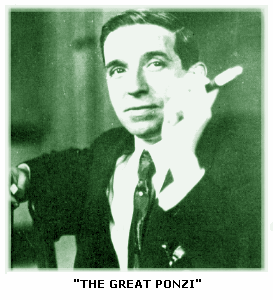One Born Every Minute
"Capitalist production is not merely the production of commodities;it is essentially the production of surplus value."
KARL MARX, Das Kapital
 In Boston in 1920 a man came up with something that was more fun than mah-jongg or petting in parked cars. The man was Charles Ponzi ( "The Great Ponzi," he liked to say) and he had the next best thing to a machine that made dollar bills. He shipped your money across the oceans and had his agents buy International Postal Union reply coupons at depressed rates and then sell them in other alien outposts which paid a higher exchange. Presto. Profit. Big profit. Ponzi offered investors $2.50 for every $1.00 they put in, payable in ninety days, if not sooner.
In Boston in 1920 a man came up with something that was more fun than mah-jongg or petting in parked cars. The man was Charles Ponzi ( "The Great Ponzi," he liked to say) and he had the next best thing to a machine that made dollar bills. He shipped your money across the oceans and had his agents buy International Postal Union reply coupons at depressed rates and then sell them in other alien outposts which paid a higher exchange. Presto. Profit. Big profit. Ponzi offered investors $2.50 for every $1.00 they put in, payable in ninety days, if not sooner. You didn't believe it? The first financial writer who suggested that no juggling of foreign currencies could produce any such staggering windfalls drew a fast libel suit from Ponzi. The dandy little forty-two-year-old "financier"—ex-sixteen-dollar-a-week clerk, bankrupt in a small fruit-and-vegetable business, failure as a forger and a mess as a smuggler of aliens—sued for $5,000,000 in damages.
Maybe financial writers and other educated skeptics doubted Ponzi; the people didn't. Everybody, it seemed, rushed to get in on the killing. Money poured in and out of bank accounts, stockings, piggy banks and cookie jars. It came from 40,000 people, mostly little people, and it added up to $15,000,000—all within eight months. There was more to be had, but Ponzi couldn't handle the traffic, not even with branch offices scattered over New England, New York and New Jersey. The get-rich-quick legion massed at the State House in Boston one day when the flashy money-trader was called in to answer some questions about his operations. This exchange on the steps illustrated his popularity:
VOICE IN CROWD: You're the greatest Italian of them all.
PONZI: No, no. Columbus and Marconi. Columbus discovered America. Marconi
discovered the wireless.
VOICE IN CROWD: Yes, but you discovered money!
piles of doughThe fact is, Ponzi hadn't. He was simply pocketing the cash as it poured into his hole-in-the-wall office on School Street. He paid old notes with the proceeds of new notes and hoped the day of judgment would never come. His overseas agents, if any, had little to do but sip wine in the sidewalk cafes. He bought and redeemed no more than thirty dollars in foreign postal coupons during his one-man gold rush.
Ponzi was at his crest, hauling in $200,000 a day from the new-found gamblers among New England's charwomen, elevator boys, peddlers, truck drivers, short-order cooks, shopkeepers, pensioners and what-have-you, when the Boston Post dug up his criminal record. ponzi houseThe dismal revelation that the Wizard of School Street had done time in Montreal for forgery and in Atlanta for smuggling aliens blew the lid off. Ponzi's paper empire collapsed, dragging with it the Hanover Trust Co., the bank he had favored with his trade. His books, such as they were, showed a deficit of $5,000,000. The federal government exacted from Ponzi a four-year term in the bastille at Plymouth for using the mails to defraud. Then the Commonwealth of Massachusetts got him sentenced to seven to nine years as a "common and notorious thief." While out on bail pending appeal, Ponzi dropped down to Florida to repair his purse in the real estate boom there, but instead picked up another year's sentence for fraud. Massachusetts finally collected him and put him away until 1934. "I bear no grudges," he said as he emerged from prison, "and I hope the world forgives me.
The world may have; the government didn't. Ponzi was deported to Italy, made his way to South America and died in a charity ward in Rio de Janeiro in 1949. Whatever happened to the cascading fortunes that passed through his sticky fingers in the first year of the Lawless Decade, no one ever said.
